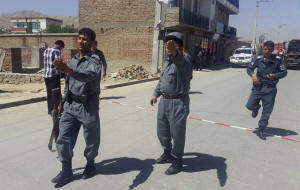|
Afghan Taliban appoint a new leader,
Kabul urges peace
 Send a link to a friend
Send a link to a friend
[May 25, 2016]
By Mirwais Harooni and Jibran Ahmad
KABUL/PESHAWAR, Pakistan (Reuters) - The
Afghan Taliban named an Islamic legal scholar who was one of former
leader Mullah Akhtar Mansour's deputies to succeed him on Wednesday,
after confirming Mansour's death in a U.S. drone strike at the weekend.
|

Afghan policemen keep watch near the site of a suicide bomb attack in
Kabul, Afghanistan, May 25, 2016. REUTERS/Mohammad Ismail |
|
 Within an hour of the announcement, a Taliban suicide bomber
attacked a shuttle bus carrying court employees west of the Afghan
capital, Kabul, killing as many as 11 people and wounding several
others, including children. Within an hour of the announcement, a Taliban suicide bomber
attacked a shuttle bus carrying court employees west of the Afghan
capital, Kabul, killing as many as 11 people and wounding several
others, including children.
New Taliban leader Haibatullah Akhundzada was named in a United
Nations report last year as former chief of the sharia-based justice
system under the Taliban's five-year rule over Afghanistan, which
ended with their ouster in 2001.
Sirajuddin Haqqani, head of a feared network blamed for many deadly
bomb attacks in Kabul in recent years, and Mullah Mohammad Yaqoob,
son of Taliban founder Mullah Mohammad Omar, will serve as deputies.
The announcement, following a meeting of the Taliban's main shura,
or leadership council, ended days of confusion during which the
Taliban declined to confirm the death of Mansour in a drone strike
in Pakistan on Saturday.
 "All the shura members have pledged allegiance to Sheikh Haibatullah
in a safe place in Afghanistan," the statement said. "All people are
required to obey the new Emir-al-Momineen (commander of the
faithful)."
Akhundzada, believed to be around 60 years of age and a member of
the powerful Noorzai tribe, was a close aide to Omar and is from
Kandahar, in the south of Afghanistan and the heartland of the
Taliban.
An official Taliban account on Twitter posted an undated photograph
purporting to be of Akhundzada, informally known as Mullah
Haibatullah, with a white turban and long, graying beard.
The post listed his full title as Emir-ul-Momineen Shiekh ul Quran,
or "commander of the faithful, scholar of the Koran".
The Taliban movement banned human images for breaching their strict
interpretation of Islam when they governed Afghanistan.
Under their rule, women could only appear in public under a heavy
veil and accompanied by a male relative, and they were denied a
formal education. Public executions were staged and sports banned.
QUESTIONS OVER PEACE TALKS
Senior members of the insurgent group had been keenly aware of the
need to appoint a candidate who could bring disparate factions
together and repair the splits that emerged last year when Mansour
was appointed.
"It was much quicker than most people expected, including myself. It
shows that the Taliban are keen not to have a new conflict," said
Thomas Ruttig of the Afghanistan Analysts Network.
 Mansour, a former deputy to Omar named as leader in 2015 after the
Taliban announced Omar had died more than two years earlier, faced
widespread anger that he had deceived the movement by covering up
his predecessor's death.
Ruttig had earlier singled out Akhundzada as a likely successor to
Mansour over more high-profile candidates, because of his
longstanding ties to a movement in need of stability.
"He is of the older generation, he is one of the founders. So he has
more respect as a religious scholar, while Sirajuddin Haqqani and
Yaqoob, the son of Mullah Omar, are pretty young," he said.
[to top of second column] |

However, there was no immediate indication of whether the
appointment would lead to a shift in the stance of the Taliban,
which under Mansour ruled out participating in peace talks with the
government in Kabul.
WARNING FOR NEW LEADER
A spokesman for Afghan Chief Executive Abdullah Abdullah called on
the new Taliban leader to join talks, or face dire consequences.
"We invite Mula #Haibatullah to peace. Political settlement is the
only option for #Taliban or new leadership will face the fate of
#Mansoor," spokesman Javid Faisal said in a tweet.
The United States, Pakistan and China have also been trying to get
the militants to the negotiating table to end a conflict that has
killed thousands of civilians and security personnel and left
Afghanistan seriously unstable.
The Taliban have made big gains since NATO forces ended their main
combat operations in Afghanistan in 2014, and now control more of
the country than at any time since they were toppled by U.S.-led
forces in 2001.
News of the appointment came as a suicide bomber attacked a bus
carrying staff from an appeal court west of Kabul.
Taliban spokesman Zabihullah Mujahid said the attack on staff from
the judicial system was in response to the Afghan government's
decision earlier this month to execute six Taliban prisoners on
death row. Other attacks would follow, he added.
"We will continue on this path," he said in a statement.

The Kabul police chief's spokesman said 11 people had been killed
and four wounded in the attack, although the United Nations
Assistance Mission in Afghanistan said 10 people had been wounded.
The Taliban said 22 had been killed or wounded.
Medical aid group Emergency, which runs one of Kabul's main trauma
hospitals, said it had treated nine wounded and six of these were
children aged between 8 and 13 years.
The decision by President Ashraf Ghani to execute the prisoners on
death row was taken as part of a tougher policy toward the Taliban
following a suicide attack by the insurgent movement which killed at
least 64 people in Kabul.
(Additional reporting by Kay Johnson in Islamabad and James
Mackenzie and Sayed Hassib in Kabul; writing by Kay Johnson; editing
by Mike Collett-White)
[© 2016 Thomson Reuters. All rights
reserved.]
Copyright 2016 Reuters. All rights reserved. This material may not be published,
broadcast, rewritten or redistributed.

 |